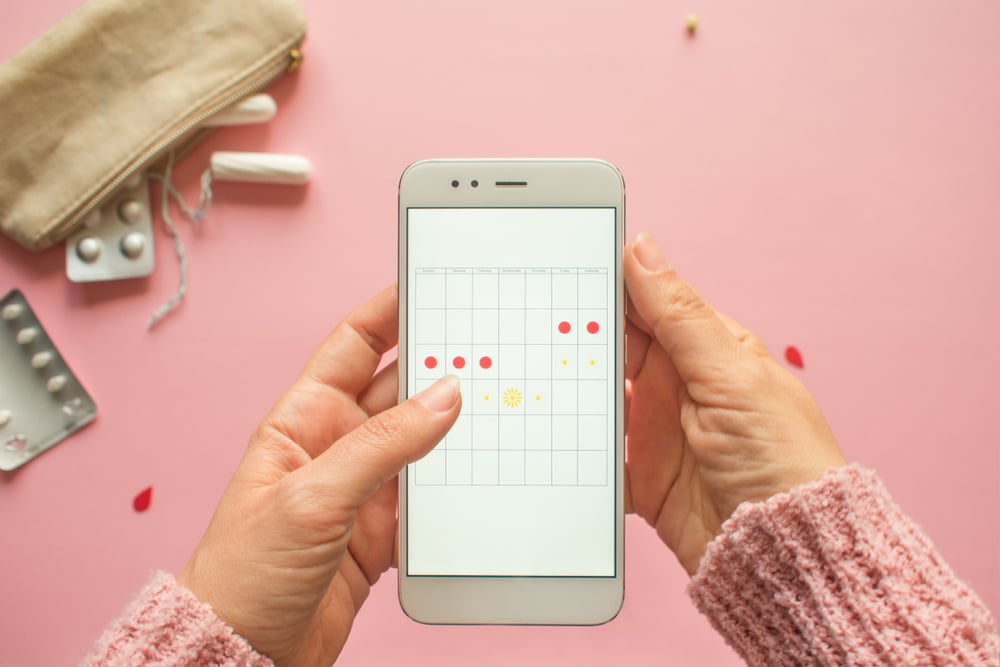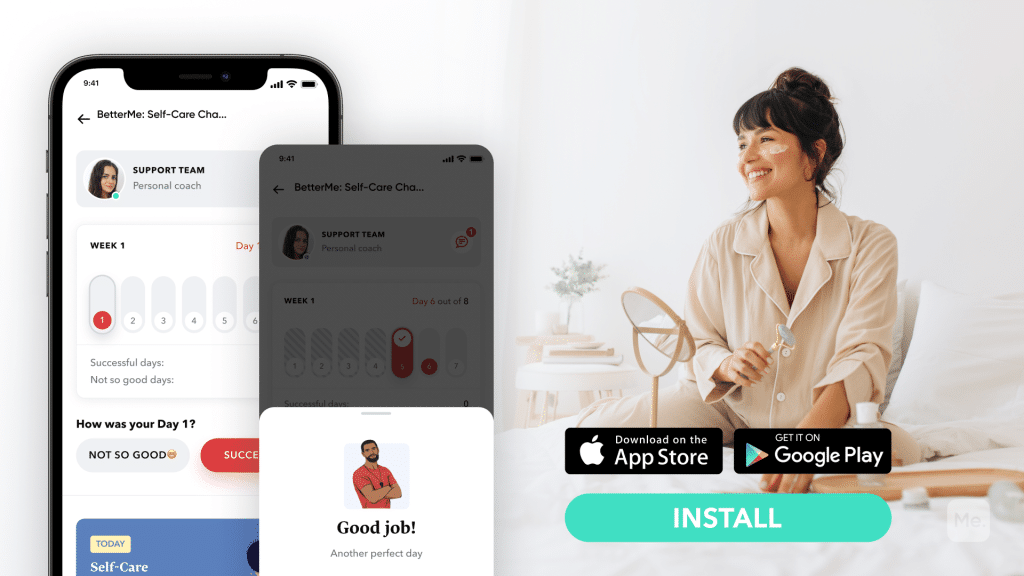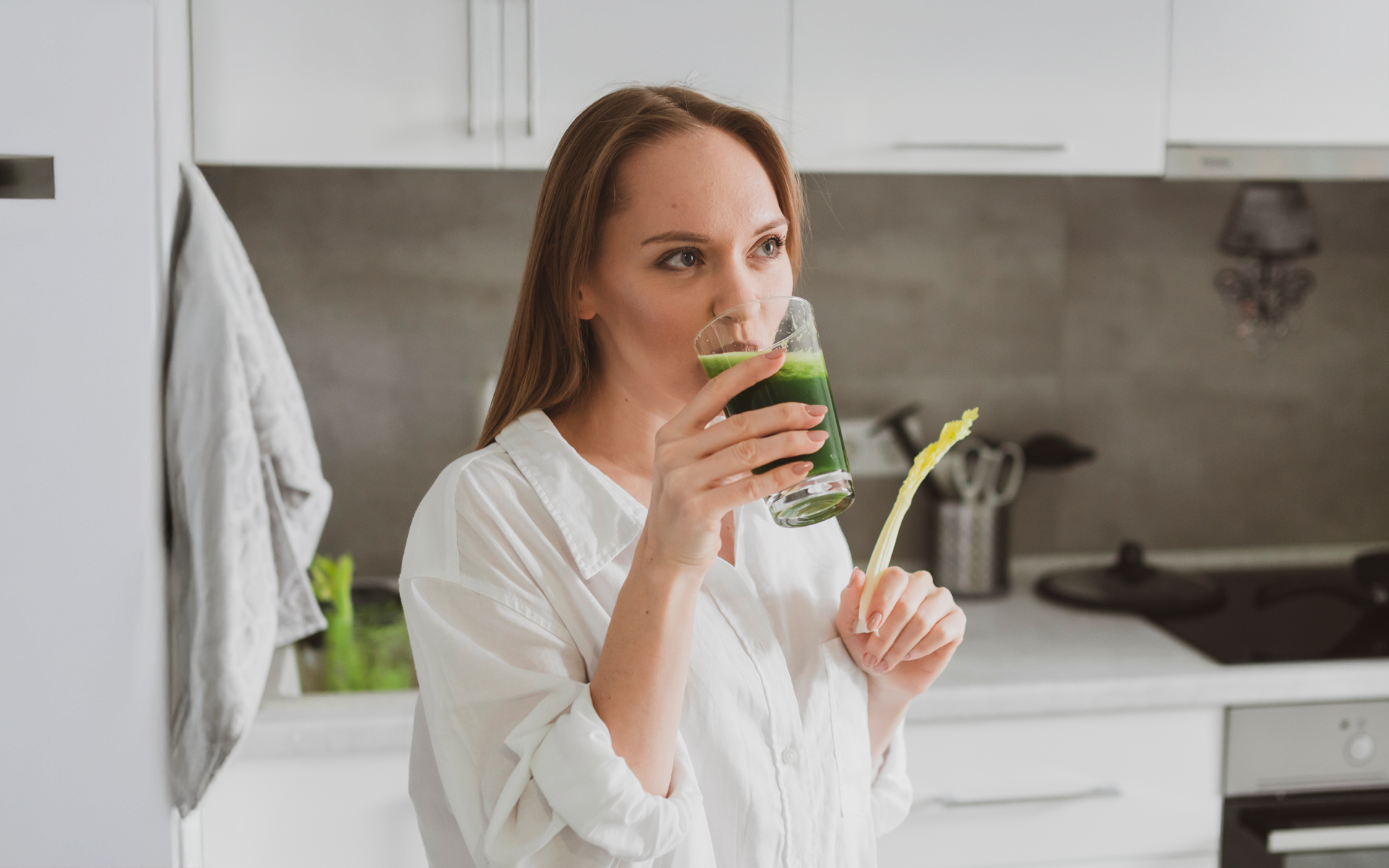You’ve probably felt it many times before—that heavy, bloated feeling during your period. You might even feel like you’ve gained weight. It’s called water retention, and it’s a common symptom of premenstrual syndrome (PMS). Premenstrual water retention happens one to two days before your period starts (9). Most women worry about it when they see the scale creep up a few pounds. Good news, the weight gain is only temporary. Water retention goes away once your period starts. There are several reasons why you might retain water before your period. We’ll discuss them and offer some tips on how to relieve the bloating.
Get your personalized
meal plan!
What Causes Water Retention Before Your Period?
Premenstrual water retention is likely caused by:
1. Hormonal Changes
Hormonal changes are the most common cause of water retention before your period. Just before your period starts, your body’s estrogen levels drop sharply. This can lead to fluid retention and bloating.
The drop in estrogen can also cause your body to retain salt (sodium), which can make you feel even more bloated.
Progesterone is another hormone that can cause water retention (17). The level of this hormone rises after ovulation (about midway through your menstrual cycle). It is a benefit by helping prepare your body for pregnancy by thickening the lining of the uterus (13).
If you don’t become pregnant, progesterone levels drop and estrogen levels rise again. This change in hormones can cause fluid retention and bloating a week or two before your period.
2. Dietary Changes
You might also retain water if you consume more salt than usual (11). This can happen if you eat a lot of processed foods (such as chips, pretzels, and frozen dinners) or if you add extra salt to your food. Too much salt can cause your body to hold onto water.
Read More: Sex On Period: Pros, Cons, And Tips
3. Medications
Certain medications can cause water retention, such as (20):
- Birth control pills
- Hormone replacement therapy
- Antidepressants
- Nonsteroidal anti-inflammatory drugs (NSAIDs)
4. Appetite Changes
Your appetite may change just before your period. You might feel hungrier than usual or you might not feel like eating at all. These changes in appetite can cause weight gain or weight loss, which can also lead to water retention.
You may crave certain foods and feel the need to eat more of them. This is called premenstrual cravings. Common foods that women crave include chocolate, sweets, and carbs in general (15).
Carbs cause your body to retain water, especially after exercise (3). So, if you’re eating more carbs than usual, you may be more likely to retain water.
5. Stress
Stress can also cause water retention. When you’re stressed, your body releases hormones such as cortisol. These hormones can lead to fluid retention and weight gain (16).
How Long Does Water Retention Last?
Water retention usually lasts for one to two days. It should go away once your period starts. If you’re still retaining water after your period, it could be a sign of a more serious problem, such as kidney disease or heart failure (4) (8). If you feel this applies to you, talk to your doctor.
How Many Pounds Of Water Can You Retain Before Your Period?
Most women retain one to four pounds of water before their period. This can cause bloating and discomfort, but it’s usually nothing to worry about.
Which Other Premenopause Symptoms May You Experience
PMS is a group of symptoms that many women experience one to two weeks before their period. In addition to water retention, other common symptoms of PMS include (14):
- Breast tenderness
- Mood swings
- Bloating
- Headaches
- Fatigue
- Acne
If you tend to let yourself off the hook, raise the white flag when things get tougher than you expected, send yourself on an unconscious binge-eating trip – BetterMe app is here to help you leave all of these sabotaging habits in the past!
How To Relieve Premenstrual Water Retention
There are several things you can do to relieve premenstrual water retention:
Exercise
Exercise can help reduce stress and improve your overall health. This can also help relieve water retention by increasing blood circulation and reducing bloating (10).
Eat Less Salt
Cutting back on salt will likely reduce water retention. Avoid processed foods, such as chips, pretzels, and frozen dinners. And don’t add extra salt to your food.
Drink More Water
Drinking more water might seem counterintuitive, but it can help reduce water retention. When you’re properly hydrated, your body doesn’t need to hold onto as much water (12).
Drink Herbal Teas
Herbal teas can also help with water retention and other PMS symptoms. Some of the best teas for PMS relief include:
- Ginger tea: Ginger has anti-inflammatory and analgesic properties that can help relieve pain, cramps, and other symptoms associated with PMS (6).
- Peppermint tea: Peppermint has a soothing effect on the digestive system and can help relieve bloating, gas, and other digestive issues that can worsen during PMS (18).
- Chamomile tea: Chamomile is a relaxant and can help reduce stress, anxiety, and irritability, all of which can be exacerbated during PMS (5).
- Dandelion tea: Dandelion is a natural diuretic for reducing water retention and bloating (7).
- Green tea: Green tea is rich in antioxidants and has been shown to help reduce inflammation, which can help relieve symptoms of PMS (2).
Take A Warm Bath
Taking a warm bath can also help reduce bloating and water retention. Add a few drops of lavender or chamomile essential oil to your bathtub to further relax your muscles and reduce stress.
Read More: Yoga For Period Cramps: Does It Work?
Wear Loose, Comfortable Clothes
Wearing tight clothes can make you feel more bloated and uncomfortable. So, it’s important to wear loose, comfortable clothes when you’re experiencing premenstrual water retention.
Take Supplements
Several supplements can help relieve PMS symptoms, such as (19):
- Vitamin B6: Vitamin B6 can help reduce bloating, water retention, and breast tenderness.
- Calcium: Calcium can help reduce cramps, bloating, and fatigue.
- Magnesium: Magnesium can help reduce cramps, anxiety, and irritability.
- Evening primrose oil: Evening primrose oil has been shown to reduce breast tenderness, cramps, and other symptoms associated with PMS.
Try Acupuncture Or Massage
Acupuncture and massage can both help relieve stress and promote relaxation (1). This, in turn should help reduce water retention.
BetterMe app is a foolproof way to go from zero to a weight loss hero in a safe and sustainable way! What are you waiting for? Start transforming your body now!
When To See A Doctor
Water retention is a common symptom of PMS. However, if you’re experiencing severe water retention, it could be a sign of a more serious condition such as kidney disease or heart failure. It’s important to see a doctor if you’re retaining water to rule out any underlying medical conditions.
The Bottom Line
Water retention is a common symptom of PMS that can cause bloating, swelling, and weight gain. There are several things you can do to relieve premenstrual water retention, such as exercise, eating less salt, and drinking more water. If you’re experiencing severe water retention, see a doctor to rule out any underlying medical conditions.
DISCLAIMER:
This article is intended for general informational purposes only and does not serve to address individual circumstances. It is not a substitute for professional advice or help and should not be relied on for making any kind of decision-making. Any action taken as a direct or indirect result of the information in this article is entirely at your own risk and is your sole responsibility.
BetterMe, its content staff, and its medical advisors accept no responsibility for inaccuracies, errors, misstatements, inconsistencies, or omissions and specifically disclaim any liability, loss or risk, personal, professional or otherwise, which may be incurred as a consequence, directly or indirectly, of the use and/or application of any content.
You should always seek the advice of your physician or other qualified health provider with any questions you may have regarding a medical condition or your specific situation. Never disregard professional medical advice or delay seeking it because of BetterMe content. If you suspect or think you may have a medical emergency, call your doctor.
SOURCES:
- Alternative techniques (2013, apa.org)
- Association of tea drinking and dysmenorrhoea among reproductive-age women in Shanghai, China (2013–2015): a cross-sectional study (2019, ncbi.nlm.nih.gov)
- Carbohydrate exerts a mild influence on fluid retention following exercise-induced dehydration (2008, pubmed.ncbi.nlm.nih.gov)
- Chronic kidney disease: How effective are diet and exercise? (2006, ncbi.nlm.nih.gov)
- Efficacy of Chamomile in the Treatment of Premenstrual Syndrome: A Systematic Review (2009, ncbi.nlm.nih.gov)
- Efficacy of Oral Ginger (Zingiber officinale) for Dysmenorrhea: A Systematic Review and Meta-Analysis (2016, hindawi.com)
- Evaluation of mint efficacy regarding dysmenorrhea in comparison with mefenamic acid: A double blinded randomized crossover study (2016, ncbi.nlm.nih.gov)
- Fluid Retention Is Associated With Cardiovascular Mortality in Patients Undergoing Long-Term Hemodialysis (2009, ahajournals.org)
- Fluid Retention over the Menstrual Cycle: 1-Year Data from the Prospective Ovulation Cohort (2011, hindawi.com)
- Health benefits of physical activity: the evidence (2006, ncbi.nlm.nih.gov)
- Increased salt consumption induces body water conservation and decreases fluid intake (2017, ncbi.nlm.nih.gov)
- Just Add Water (2008, jasn.asnjournals.org)
- Physiology, Progesterone (2021, ncbi.nlm.nih.gov)
- Premenstrual syndrome: Overview (2021, ncbi.nlm.nih.gov)
- Premenstrual Syndrome Is Associated with Dietary and Lifestyle Behaviors among University Students: A Cross-Sectional Study from Sharjah, UAE (2019, ncbi.nlm.nih.gov)
- Psychosocial Stress and Change in Weight Among US Adults (2009, ncbi.nlm.nih.gov)
- Relationship between Aldosterone and Progesterone in the Human Menstrual Cycle (2006, academic.oup.com)
- Review article: the physiological effects and safety of peppermint oil and its efficacy in irritable bowel syndrome and other functional disorders (2018, onlinelibrary.wiley.com)
- Vitamin or mineral supplements for premenstrual syndrome (2018, ncbi.nlm.nih.gov)
- When Your Weight Gain Is Caused by Medicine (n.d., urmc.rochester.edu)











